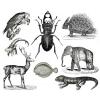news
Norton Asks Presidential Commission to Consider Impacts of Synthetic Biology on Biodiversity
Primary tabs
Researchers in the emerging field of synthetic biology are going beyond the recombination of genetic material, such as hybrid corn or genetically altered vegetables, to create new material and life forms with no precedents in the natural world. Is that an important difference?
Further, might such synthetic life forms damage efforts to protect Earth’s naturally occurring biodiversity?
“Such questions should be fundamental to formulation of biodiversity policy and consideration of the future of biodiversity,” says Bryan G. Norton, Distinguished Professor of Philosophy, Science, and Technology in the School of Public Policy. “Yet debate on the topic has been muted, at best.”
A biodiversity advocate, Norton presented his concerns during the second meeting of the Presidential Commission for the Study of Bioethical Issues September 13-14 in Philadelphia.
Underlying the specifics Norton raised to the commission [see full remarks], is his concern that, “As the emergent field develops a conceptual framework appropriate to its internal needs, it may lose its connection to biology and ecology, and practitioners may lack the conceptual links that encourage them to recognize the importance of natural habitats for wild species.”
“Synthetic life forms are not, and cannot be, a substitute for a living, breathing, evolving species. To the extent that life forms are reduced to collections of ‘biobricks’ without a clear articulation of the importance of natural diversity for both instrumental and more moral reasons, synthetic biology may unwittingly become the enemy of biodiversity protection in situ.”
Norton did not predict answers to the discussion points he posed to the commission; he posed possible scenarios and evermore profound questions for consideration such as will society’s current values about nature and wild species somehow be devalued by the advance of synthetic biology?
“It is not implausible to claim that a culture that sees life as collections of biobricks might lose its passion for wild nature and forget its moral value beyond its exchange value,” said Norton.
He advocated an active effort to encourage dialogue between synthetic biologists and conservation biologists. “Our culture needs to have an enlightening discourse, in conjunction with the examination of policies to guide synthetic biology, about the diversity of meanings of ‘diversity’ that currently stifle any common discourse among practitioners of conservation biology, environmental policy, and synthetic biology.”
Norton’s discussion of concerns about the divorce of synthetic biology from the broader discourse of biology was complemented in the ethics session by a discussion, presented by Jonathan Moreno, the David and Lyn Silfen University Professor of Ethics and Professor of Medical Ethics and of History and Sociology of Science at Penn, of the risks that synthetically created life forms might escape from laboratories.
It was agreed by Commission members that both of these concerns must be an important part of the future discussion of policy regarding synthetic biology. The Commission will, ultimately, advise President Obama relative to bioethical issues and technologies with a goal of “identifying and promoting policies and practices that ensure scientific research, healthcare delivery, and technological innovation are conducted in an ethically responsible manner.” It continues to gather input from academic and other experts. The next meeting occurs November 16-17 in Atlanta.
Archived video of Norton’s presentation can be seen at: www.Bioethics.gov. Go to Meetings, Past Meetings, Aug. 29-30, 2010, choose “Archived Video” and go to Session 5.
Status
- Workflow status: Published
- Created by: Lauren Langley
- Created: 10/12/2010
- Modified By: Fletcher Moore
- Modified: 10/07/2016
Categories
Keywords


